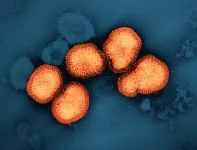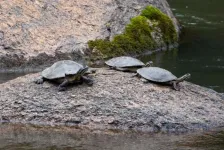(Press-News.org) Rochester Institute of Technology scientists have once again used data from the James Webb Space Telescope (JWST) as part of the Cosmic Evolution Early Release Science (CEERS) Survey to change the way we think about the universe and its distant galaxies.
Jeyhan Kartaltepe, associate professor in the School of Physics and Astronomy, and Rebecca Larson, postdoctoral research associate, co-authored a paper, “Confirmation and refutation of very luminous galaxies in the early Universe,” published in Nature confirming very bright galaxies in the early universe, while also disproving the identification of what would have been the most distant galaxy ever found.
Kartaltepe and Larson, along with co-authors from around the world, studied the redshift (or displacement of the spectrum of an object toward longer, red wavelengths) of several specific galaxies to see how much the light shifted, which indicates how far away the galaxies are. The CEERS team focused on Maisie’s Galaxy, which was theorized to have a redshift of z ≈ 11.5, while a team in Scotland researched a nearby galaxy that they believed could have a redshift of z ≈ 16, far larger than any ever found before.
To examine further, the two teams partnered on a proposal to receive follow-up spectroscopy. When the new data came in, the teams were able to precisely measure the redshifts of both of these candidates, along with a few others.
“Spectra are how you really confirm what a galaxy’s redshift is,” explained Kartaltepe. “For these two galaxies, the answer was very clear—the spectra look completely different. We confirmed that Maisie’s Galaxy is at the high redshift we thought it was.”
The group also found that because of a coincidence that mimicked the colors of a high redshift galaxy, the other galaxy is not at a redshift of z ≈ 16, but at a redshift of z ≈ 4.9. Both the initial and follow-up data from JWST turned the theories into discoveries.
“Not only did JWST find these galaxies we didn’t know about before, but then it confirmed the redshift for them,” said Larson. “This paper in particular speaks to the power of not only JWST finding galaxies in the really early universe but also confirming and characterizing them.”
The research and the paper would not have been possible without dedicated collaboration between the CEERS team and the team in Scotland. Instead of working separately on their individual galaxies and submitting separate proposals, the partnership allowed for the follow-up spectroscopy to be accepted, and the subsequent analysis to be conducted efficiently, leading to new information about the universe.
“It’s truly a testament to what people can do when they choose to work together,” said Larson. “It was a great experience and I’m really glad we got to work with the team in Scotland. It’s because we worked together that any of this happened.”
When researching the data from JWST, scientists aim to find the highest redshift galaxies, or the most distant galaxies. Finding galaxies in the very early universe was one of the goals for the JWST. These and other early discoveries have proven the success of the telescope, even this early in its existence.
“It shows us how powerful the telescope is and its ability to do the things it was built to do,” said Kartaltepe. “In some ways, it performs even better than we expected. We are already learning so much about the universe early on in JWST’s mission. I think going forward we’re going to be able to build large samples over larger areas and really be able to dig deeper into the physical characteristics of galaxies in the early universe.”
“We are really making exciting discoveries,” added Larson. “It’s truly just beginning.”
END
RIT collaboration with global team confirms, disproves distant galaxies
Jeyhan Kartaltepe and Rebecca Larson co-authored paper published in ‘Nature’ journal
2023-09-15
ELSE PRESS RELEASES FROM THIS DATE:
In major breakthrough, researchers close in on preeclampsia cure
2023-09-15
Researchers from Western and Brown University have made groundbreaking progress towards identifying the root cause and potential therapy for preeclampsia.
The pregnancy complication affects up to eight per cent of pregnancies globally and is the leading cause of maternal and fetal mortality due to premature delivery, complications with the placenta and lack of oxygen.
The research, led by Drs. Kun Ping Lu and Xiao Zhen Zhou at Western, and Drs. Surendra Sharma and Sukanta Jash at Brown, has identified ...
Facebook's design makes it unable to control misinformation
2023-09-15
WASHINGTON (September 15, 2023) – As misinformation flourished online during the Covid-19 pandemic, a number of platforms announced policies and practices aimed at combating the spread of misinformation. Did those efforts work?
New research published today in Science Advances suggests that the Covid-19 vaccine misinformation policies of Facebook, the world’s largest social media platform, were not effective in combating misinformation. The study, led by researchers at the George Washington University, found that Facebook’s efforts were undermined by the core design features ...
Study shows replanting logged forests with diverse mixtures of seedlings accelerates restoration
2023-09-15
Twenty-year experiment finds that active replanting beats natural recovery for restoring logged tropical forests.
The higher the diversity of replanted tree species, the more quickly canopy area and biomass recovered.
Results emphasize the importance of preserving biodiversity in pristine forests and restoring it in recovering logged forest.
Satellite observations of one of the world’s biggest ecological experiments on the island of Borneo have revealed that replanting logged forests with diverse mixtures of seedlings can significantly accelerate their recovery. The results have been published today in the journal Science Advances.
The ...
NIH clinical trial of universal flu vaccine candidate begins
2023-09-15
Enrollment in a Phase 1 trial of a new investigational universal influenza vaccine candidate has begun at the National Institutes of Health’s Clinical Center in Bethesda, Maryland. The trial is sponsored by the National Institute of Allergy and Infectious Diseases (NIAID), part of the NIH, and will evaluate the investigational vaccine for safety and its ability to elicit an immune response.
Currently available seasonal influenza (or “flu”) vaccines are effective at preventing specific strains of influenza. Each year, the vaccines are re-evaluated and changed to best match the strains of flu predicted to be the most dominant in the upcoming flu ...
UMass Amherst neuroscientist aims to advance knowledge of human brain development by mapping the sea slug brain
2023-09-15
A University of Massachusetts Amherst neuroscientist has been awarded a $3.1 million grant from the National Institute of Neurological Disease and Stroke to advance knowledge on human brain development by using an unusual subject: the brain of the sea slug.
This tiny invertebrate is an ideal candidate to study for brain development because it adds a countable number of neurons to its brain – the number increases more than 40-fold in less than eight weeks to a total of about 10,000 neurons – while the animal grows and performs behaviors, ...
No pollen, no seeds
2023-09-15
North Carolina State University researchers have successfully transferred an important gene from one compartment of a plant cell to another to produce tobacco plants that lack pollen and viable seeds, while otherwise growing normally. Their findings could lead to better ways of producing hybrid seeds to maximize crop productivity, or to introduce seedlessness in fruit species lacking the often-desired trait, such as raspberries, blackberries or muscadine grapes.
The researchers began the work in the energy-producing portion of a cell, the mitochondria. In plants, aberrations within the mitochondrial genome can be associated with ...
Hydroelectric power plants in Brazil threaten turtles that depend on rapids, study warns
2023-09-15
A research project supported by FAPESP shows that the construction of new hydroelectric power plants in Brazil’s South region could have an impact on more than 30% of the habitat of Phrynops williamsi, the Williams’ side-necked turtle. The species occurs only in areas of Atlantic Rainforest and Pampa (the grassland biome adjacent to Brazil’s border with Uruguay and Argentina), and is classed as “Vulnerable” (facing a high risk of extinction) by the International Union for Conservation of Nature (IUCN).
An article on the study is published in the Journal of Applied Ecology by ...
NIH awards $13.7 million grant to BU researchers investigating genetics of Alzheimer’s disease
2023-09-15
(BOSTON)—The National Institutes of Health/National Institute on Aging recently awarded a $13.7 million grant to a project led by Boston University Chobanian & Avedisian School of Medicine principal investigators Lindsay Farrer, PhD, chief of biomedical genetics and distinguished professor of genetics, and Richard Sherva, PhD, assistant professor of medicine in biomedical genetics, for research using whole genome sequencing and other approaches to identify genetic factors for Alzheimer disease (AD) in Jews currently living in ...
Purdue researcher awarded $1.3 million for malaria drug trials in Southeast Asia and Africa
2023-09-15
WEST LAFAYETTE, Ind. – A Purdue researcher is taking a giant leap forward in the fight against drug-resistant strains of malaria in developing countries.
Open Philanthropy has awarded $1.38 million to Philip Low to further validate a drug therapy that he and his colleagues have previously shown to successfully treat the disease. Low (rhymes with “now”) is Purdue University’s Presidential Scholar for Drug Discovery and the Ralph C. Corley Distinguished Professor of Chemistry in the College of Science.
For years, experts ...
Study: No evidence that YouTube promoted anti-vaccine content during COVID-19 pandemic
2023-09-15
CHAMPAIGN, Ill. — New research led by data science experts at the University of Illinois Urbana-Champaign and United Nations Global Pulse found that there is no strong evidence that YouTube promoted anti-vaccine sentiment during the COVID-19 pandemic.
The study, published in the Journal of Medical Internet Research, performed an algorithmic audit to examine if YouTube’s recommendation system acted as a “rabbit hole,” leading users searching for vaccine-related videos to anti-vaccine content.
For the study, the researchers asked World Health Organization-trained participants and workers from Amazon Mechanical Turk to intentionally ...
LAST 30 PRESS RELEASES:
University of Ottawa Heart Institute, the University of Ottawa and McGill University launch ARCHIMEDES to advance health research in Canada
The world’s largest brain research prize awarded for groundbreaking discoveries on how we sense touch and pain
Magnetofluids help to overcome challenges in left atrial appendage occlusion
Brain-clearing cells offer clues to slowing Alzheimer’s disease progression
mRNA therapy restores fertility in genetically infertile mice
Cloaked stem cells evade immune rejection in mice, pointing to a potential universal donor cell line
Growth in telemedicine has not improved mental health care access in rural areas, study finds
Pitt scientists engineer “living eye drop” to support corneal healing
Outcomes of older adults with advanced cancer who prefer quality of life vs prolonging survival
Lower music volume levels in fitness class and perceived exercise intensity
Of crocodiles, counting and conferences
AERA announces 2026 award winners in education research
Saving two lives with one fruit drop
Photonic chips advance real-time learning in spiking neural systems
Share of migratory wild animal species with declining populations despite UN treaty protections worsens from 44% to 49% in two years; 24% face extinction, up 2%
One in 20 babies experiences physical abuse, global review finds
Tundra tongue: The science behind a very cold mistake
Targeting a dangerous gut infection
Scientists successfully harvest chickpeas from “moon dirt”
Teen aggression a warning sign for faster aging later in life
Study confirms food fortification is highly cost-effective in fighting hidden hunger across 63 countries
Special issue elevates disease ecology in marine management
A kaleidoscope of cosmic collisions: the new catalogue of gravitational signals from LIGO, Virgo and KAGRA
New catalog more than doubles the number of gravitational-wave detections made by LIGO, Virgo, and KAGRA observatories
Antifibrotic drug shows promise for premature ovarian insufficiency
Altered copper metabolism is a crucial factor in inflammatory bone diseases
Real-time imaging of microplastics in the body improves understanding of health risks
Reconstructing the world’s ant diversity in 3D
UMD entomologist helps bring the world’s ant diversity to life in 3D imagery
ESA’s Mars orbiters watch solar superstorm hit the Red Planet
[Press-News.org] RIT collaboration with global team confirms, disproves distant galaxiesJeyhan Kartaltepe and Rebecca Larson co-authored paper published in ‘Nature’ journal





